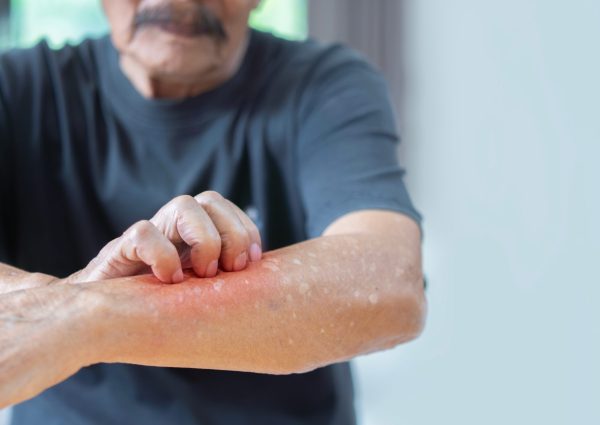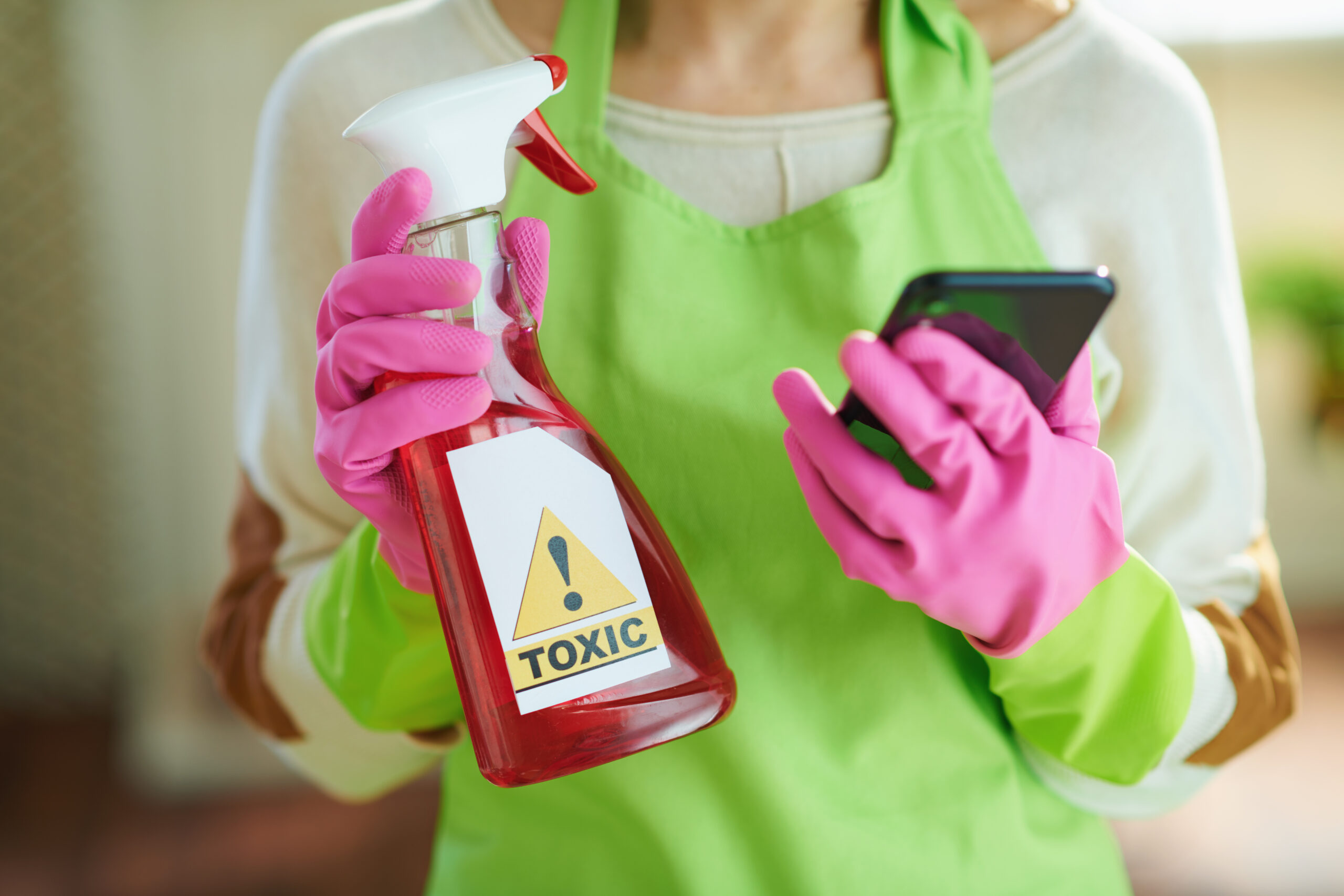Household Cleaners
Key Concerns
Many common household cleaners contain strong chemicals that can pose health risks, especially for older adults. Products with ammonia, bleach, or strong fragrances can irritate the eyes, skin, and lungs, and may trigger respiratory conditions like asthma or COPD. Accidental mixing of certain cleaners—such as bleach and ammonia—can release toxic gases. Older adults may also be more sensitive to chemical exposure due to age-related changes in the body or existing health conditions. To stay safe, it’s important to use cleaners in well-ventilated spaces, wear gloves when needed, and opt for milder or non-toxic cleaning alternatives whenever possible. For more information about safe household cleaners, visit this website for more information https://www.epa.gov/saferchoice

Sources

Ingredients
Many household cleaning products contain harmful chemicals such as ammonia, chlorine bleach, phosphates, nitrogen compounds, and volatile organic compounds (VOCs). These ingredients are commonly found in aerosol sprays, disinfectants, air fresheners, detergents, and polishes. They can pose serious health risks, especially to older adults, by irritating the skin, eyes, and lungs, and reducing indoor air quality. VOCs in particular can become airborne and may lead to headaches, respiratory issues, or worsening asthma symptoms. Additionally, some chemical residues can damage water quality when rinsed down the drain. Choosing low-toxicity or fragrance-free alternatives and ensuring proper ventilation can significantly reduce these risks.
How to Limit & Avoid Risks Associated with Household Cleaners
- Choose products with eco-labels
Look for cleaners certified with reputable ecolabels (like EPA Safer Choice, Green Seal, or EcoLogo). These products are made with fewer toxic ingredients and are designed to be safer for health and the environment. - Ensure proper indoor air quality
Improve ventilation by opening windows and using fans or dehumidifiers during and after cleaning. This helps reduce the buildup of gases and fumes from cleaning products. - Select “Safer Choice” labeled products
Products labeled with “Safer Choice” meet strict U.S. EPA standards for human and environmental health. These cleaners avoid harsh chemicals and are ideal for sensitive individuals. - Prevent skin irritation
Wear gloves when using chemical cleaners and always wash your hands thoroughly with soap and warm water after use. Avoid using strong products on bare skin and opt for gentler, fragrance-free options. - Read product labels carefully
Always check the label for directions, warnings, and proper usage. Avoid mixing products like bleach and ammonia, which can release toxic gases. - Store products safely
Keep cleaning products out of reach of children and away from heat or sunlight. Ensure bottles are tightly sealed and stored in a cool, ventilated space.
Frequently Asked Questions
1. Are all household cleaners safe to use?
Not all cleaners are equally safe. Some contain harsh chemicals like ammonia, bleach, or phosphates that can irritate the skin, eyes, or lungs. Look for eco-labeled or “safer choice” products with fewer toxic ingredients.
2. What are VOCs and why should I avoid them?
VOCs (Volatile Organic Compounds) are chemicals found in many cleaning products, especially sprays and air fresheners. They can reduce indoor air quality and may cause breathing problems especially for those with asthma or weak lungs.
3. Can I mix different cleaners together for better results?
No, mixing cleaners especially bleach and ammonia can create toxic fumes that are extremely dangerous to inhale. Always use one product at a time and follow label instructions carefully.
4. What cleaning products should older adults avoid?
Older adults should avoid strong chemical-based cleaners, especially those that are heavily fragranced, contain chlorine, or require extensive scrubbing. Choose gentler, fragrance-free, or plant-based products instead.
5. How can I reduce exposure to harmful ingredients while cleaning?
- Ventilate the room by opening windows or using exhaust fans
- Wear gloves and avoid touching your face
- Use safer products with fewer harmful chemicals
- Clean with warm water and mild soap when possible
6. Are homemade cleaners a safe alternative?
Yes, simple homemade cleaners (like vinegar and baking soda) can be effective for many cleaning tasks and are often safer. Just be sure not to mix vinegar with bleach or other chemicals.
7.What should I know about ammonia in household cleaners?
Ammonia is a powerful ingredient found in many glass and surface cleaners. While it helps cut through grease and grime, its fumes can be harmful especially to older adults with breathing problems. Always use ammonia-based products in a well-ventilated area. Most importantly, never mix ammonia with bleach, as it creates a dangerous toxic gas. If you’re sensitive to strong smells or have health concerns, look for ammonia-free or natural cleaning alternatives.
References & Helpful Articles
- https://www.epa.gov/saferchoice/products
- https://www.epa.gov/greenerproducts/identifying-greener-cleaning-products
- https://www.epa.gov/indoor-air-quality-iaq/air-cleaners-and-air-filters-home
- https://www.epa.gov/saferchoice/learn-about-safer-choice-label
- https://www.cdc.gov/widgets/micrositeCollectionViewerMed/index.html?chost=covid19.mt.gov&cpath=/&csearch=&chash=&ctitle=Governor%E2%80%99s%20Coronavirus%20Task%20Force%20%3E%20Home&wn=micrositeCollectionViewerMed&wf=/widgets/micrositeCollectionViewerMed/&wid=micrositeCollectionViewerMed1&mMode=widget&mPage=&mChannel=&cdcDataid=404908&cdcTheme=theme1&cdcGeotag=%7B%27continent%27:%20%276255149%27,%20%27country%27:%20%276252001%27,%20%27state%27:%20%27%27,%20%27region%27:%20%27%27%20%7D&chashOptMode=out#!/detail/404496
- https://www.lung.org/clean-air/indoor-air/indoor-air-pollutants/cleaning-supplies-household-chem